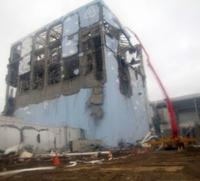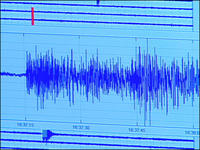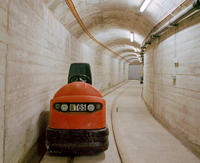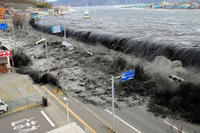-
Hosting a holiday disaster kit potluck
Cindi Shank, the executive director of the Southwest Colorado chapter of the American Red Cross, is encouraging local residents to host a party where instead of bringing potluck dishes they bring flashlights and bandages
-
-
Fukushima reaches cold shutdown conditions, critics scoff

Last week Japanese officials declared that the beleaguered Fukushima Daiichi power plant had become stable enough for engineers to complete a “cold shutdown”; officials also stated that the facility had ceased to leak substantial amounts of radiation, a claim received skeptically by critics
-
-
Building earthquake-proof buildings
Researchers in Australia are leading an international project to help identify buildings most vulnerable to earthquakes and the best ways to strengthen them
-
-
Thai health officials prevent outbreaks in historic floods
Thanks to Thailand’s aggressive public health and emergency response operations, the country managed successfully to prevent disease outbreaks following record floods
-
-
New York moves swiftly to spend Hurricane disaster funds
Less than a week after Hurricane Irene blasted New York with wind and rain, state emergency officials had authorized disaster relief funds and were swiftly distributing them to hard hit farmers and residents
-
-
Developing prototype for early warning quake system

In an effort to help catalyze the creation of an early warning earthquake system along the West Coast, the Gordon and Betty Moore Foundation recently awarded $6 million to three universities in the quake prone region
-
-
Officials say D.C. prepared for disasters following earthquake and snowstorm
This year a massive snowstorm and earthquake left D.C. residents stuck in traffic for hours as they attempted to leave the city, but emergency officials say they are better prepared for future disasters because of those incidents
-
-
Decontaminating radiation-laced water at Fukushima Daiichi
Thanks to special radiation devices, made by UOP LLC, a Honeywell company, cleanup crews in Japan have been able to treat five million gallons of water contaminated by radiation at the Fukushima Daiichi nuclear power plant
-
-
Disaster evacuation plans need to incorporate family perspectives
A recent study sponsored by the National Science Foundation found that most respondents felt the evacuation of New Orleans residents to the Superdome after Hurricane Katrina was a “failure” and this opinion has shaped their willingness to accept shelter if offered in an emergency evacuation
-
-
Emergency response for the disabled

Roughly 56 million Americans have a disability and with many living without a telephone or television, communicating with them in the event of a major disaster is no easy task; to address the needs of disabled Americans during natural and manmade disasters, emergency officials recently participated in a seminar called “Planning for the Whole Community”
-
-
Disaster-proofing email servers for maximum resiliency

On Tuesday Databarracks announced the launch of its Hosted Exchange solution, which allows companies to host email servers in a virtually indestructible location – a former U.K. Ministry of Defense bunker designed to protect critical systems in the event of a nuclear war
-
-
Japan tsunami waves merged, doubling power

Researchers have discovered that the destructive tsunami generated by the March 2011 Tōhoku-Oki earthquake was a long-hypothesized “merging tsunami” that doubled in intensity over rugged ocean ridges, amplifying its destructive power before reaching shore
-
-
U.S. 2011 billion-dollar disasters
The National Oceanic and Atmospheric Administration (NOAA) has recalculated the number of weather disasters in the United States which passed the billion dollar mark; NOAA added two disasters, pushing the 2011 tally to twelve billion-dollars-or-more disasters; these disasters caused more than 1,000 deaths and inflicted damaged estimated at $52 billion
-
-
New severe-weather alert service launched
Reddaway has announced a new Service Alert process that will inform customers about situations that may impact their supply chain
-
-
Making sure skyscraper foundations stand up to earthquakes
Engineers are preparing to conduct the first rigorous tests of how the steel columns that secure skyscrapers to their foundations stand up during earthquakes, research that could make the towering structures safer — and perhaps less expensive to build
-
More headlines
The long view
The Surprising Reasons Floods and Other Disasters Are Deadlier at Night
It’s not just that it’s dark and people are asleep. Urban sprawl, confirmation bias, and other factors can play a role.
Why Flash Flood Warnings Will Continue to Go Unheeded
Experts say local education and community support are key to conveying risk.
